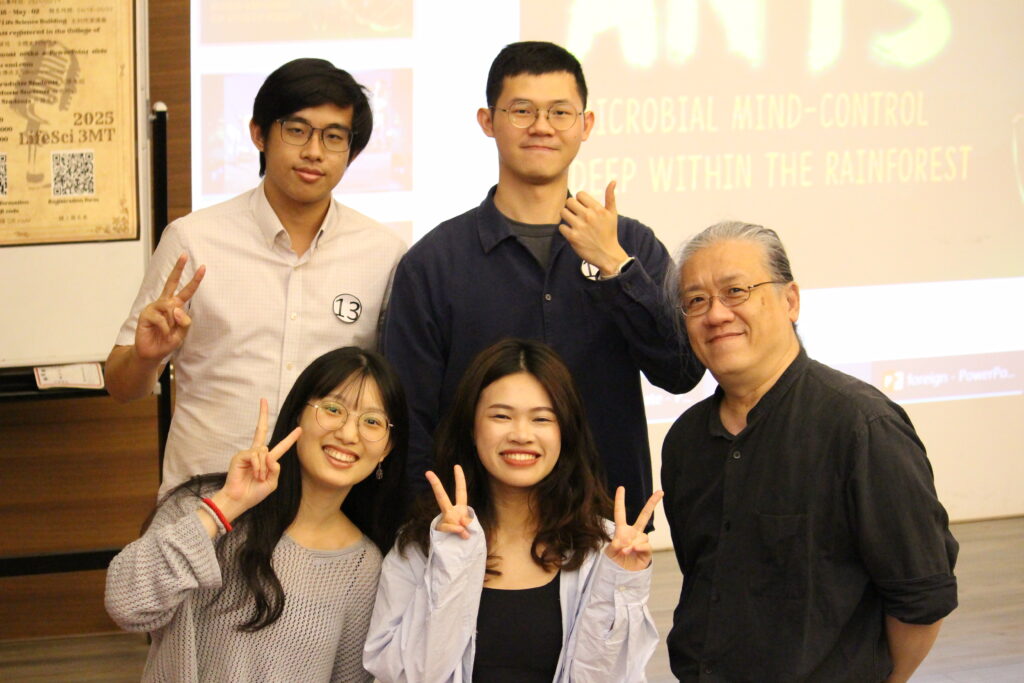About us
Welcome to the Microbial Genomics Laboratory at the Institute of Genomics and Bioinformatics (IGB), National Chung Hsing University, led by Prof. Ying-Tsong Chen.
Our group studies bacterial pathogens using genome sequencing, bioinformatics, and functional genomics to uncover mechanisms of antibiotic resistance, virulence, and microbial evolution.
歡迎
歡迎來到國立中興大學基因體暨生物資訊研究所的微生物基因體研究室。本實驗室由陳盈璁教授主持,主要透過基因體定序、生物資訊分析與功能性實驗,探討細菌抗藥性、毒力,以及新興感染症的分子演化。

我們研究室的成員主要來自本校基資所碩士班的研究生,博班生則來自本校生科院醫學科學博士學位學程。此外,我們研究室也接受本院在職專班的碩士班學生。
對,我們定序基因體。We do sequencing, yes — but what we’re really doing is reading how life writes itself.
The Microbial Genomics Laboratory is located on the 7th floor (Room 711) of the Plant and Animal Quarantine Building at National Chung Hsing University. Prof. Ying-Tsong Chen joined the Institute of Genomics and Bioinformatics in 2010 and has since established the lab.
Prof. Ying-Tsong Chen has long been engaged in bacterial genomics research and has contributed to several landmark projects. His past work includes:
- Sequencing and analysis of the large virulence plasmid pLVPK in Klebsiella pneumoniae
- The first whole-genome sequencing of an NDM-1 “superbug” isolate in Taiwan
- Complete genome sequencing of the representative Taiwanese lineage Staphylococcus aureus ST59
- Discovery and genome sequencing of the first genotoxic Klebsiella pneumoniae strain
Building on these foundations, our laboratory now focuses on applying genomics and functional approaches to investigate antibiotic resistance, virulence, and the evolution of emerging bacterial pathogens.
Our lab members are mainly master’s students from the Institute of Genomics and Bioinformatics, with doctoral students from the Graduate Program in Biomedical Sciences, College of Life Sciences. We also host students from the in-service master’s program.
Our core expertise is high-throughput genome sequencing (Illumina, Oxford Nanopore) and bioinformatics analysis, combined with functional genomics experiments. Research often spans from bacterial culture, molecular assays, sequencing, to advanced computational analyses. We welcome students from diverse academic backgrounds to join us in exploring and learning across disciplines.
We collaborate with many partners, including the National Health Research Institutes, Changhua Christian Hospital, Chung Shan Medical University, and China Medical University.
Current Research Topics
Our ongoing projects explore three major areas:
- Plasmid-borne transcriptional regulators (RamAp in Salmonella) – investigating how horizontal acquisition of regulatory genes reshapes bacterial resistance and virulence.
- Emerging pathogens (Elizabethkingia species) – applying comparative and functional genomics to understand their cefiderocol resistance, virulence factors, and nosocomial transmission.
- Endosymbiotic bacteria (Wolbachia) – developing innovative nanopore sequencing strategies to recover complete genomes from insect hosts, with applications in vector biology and disease control.
關於我們
微生物基因體研究室位於國立中興大學動植物防檢疫大樓七樓 711 室,由陳盈璁教授主持。陳教授於 2010 年加入基因體暨生物資訊研究所,並自此成立實驗室。
主持人致力於應用基因體學技術探討人類細菌病原的抗藥性、毒力與分子演化。多年來,我們完成了多項具代表性的基因體計畫,包括:
- 克雷白氏肺炎菌大型毒性質體 pLVPK 的序列分析
- 台灣首例 NDM-1 超級細菌的全基因體定序
- 台灣代表性金黃色葡萄球菌 ST59 的完整基因體定序
- 發現並定序第一個基因毒性的克雷白氏肺炎菌株
實驗室成員主要來自本校基資所碩士班,博士生則來自生科院醫學科學博士學位學程,並同時培育在職專班的碩士生。
我們的核心專長是 高通量基因體定序(Illumina、Oxford Nanopore) 與 生物資訊分析,並結合功能性基因體學實驗。研究範圍跨越細菌培養、分子實驗、定序到各類計算分析工具的應用。我們歡迎不同學科背景的同學加入,一同跨域研究與學習。
我們與多個合作單位密切合作,包括國家衛生研究院、彰化基督教醫院、中山醫學大學與中國醫藥大學等。
目前的研究主題
我們近來研究計畫聚焦於三個主要領域:
- 質體攜帶的轉錄調節子:探討水平轉移的調控基因如何改變細菌的抗藥性與毒力。
- 新興病原伊莉莎白菌:透過比較與功能性基因體學,研究其對抗藥性、毒力因子與院內感染的傳播。
- 共生菌(Wolbachia):開發創新的 Nanopore 定序策略,從昆蟲宿主中完整解析其基因體,並應用於病媒生物與疾病控制研究。
對細菌的基因體學研究有興趣,歡迎與我們攜手一起努力喔!

Strain/DNA Requests
Published materials are available for qualified researchers. Since some of the published bacterial strains and genetic materials are still under investigation, their distribution is regulated to avoid conflicts with ongoing projects. Most of the bacterial strains and DNA used in our studies are provided by collaborators; we do not own these resources and therefore do not keep them for long-term storage.
If you are interested in obtaining bacterial strains or DNA samples, please send a request email to Dr. Ying-Tsong Chen (onion@nchu.edu.tw). Your request should include:
- A concise description of your research project
- The specific aims of your research
- An explanation of how the requested materials will contribute to your work
For bacterial strains collected or isolated by our collaborators, we will forward your request to them (mostly microbiologists from hospitals or universities in Taiwan). Please note that in many cases, collaborators will conduct functional studies after we finish or publish genome sequencing; under such circumstances, materials will not be shared for the same purpose as long as the collaborator is actively working on that project.
Recipients of materials must agree to:
- Use the materials only for the stated purpose
- Not transfer them to third parties
- Properly destroy unused materials at the end of the project
Due to limited manpower, handling international transfers of bacterial strains is highly challenging. If DNA alone is sufficient for your research, please refrain from requesting bacterial strains.
菌株與 DNA 申請
已發表的材料可提供給合格的研究人員使用。由於部分已發表的細菌株與遺傳物質仍在研究中,其分配受到管制,以避免與正在進行的計畫衝突。我們研究中所使用的細菌株與 DNA 多半來自合作單位,本實驗室並不擁有這些資源,因此不會長期保存。
若您有興趣申請細菌株或 DNA 樣本,請來信聯繫陳盈璁教授 (onion@nchu.edu.tw),並於信中提供:
- 您研究計畫的簡要說明
- 研究的具體目標
- 申請材料對您研究的幫助與用途
對於由合作單位蒐集或分離的細菌株,我們將轉交您的申請給相關單位(多為台灣各醫院或大學的微生物學研究者)。請注意,多數情況下合作單位會在我們完成或發表基因體定序後,進一步進行功能性研究。在合作單位仍持續進行該研究時,材料將不會提供給其他研究者作相同用途。
申請人必須同意以下規範:
- 僅能依申請目的使用材料
- 不得轉交給第三方
- 計畫結束後需銷毀未使用完的材料
由於人力有限,處理細菌株的國際運送相當困難。如果您的研究僅需 DNA,請避免提出菌株的申請。